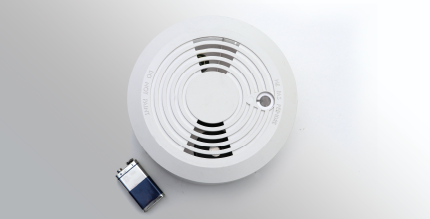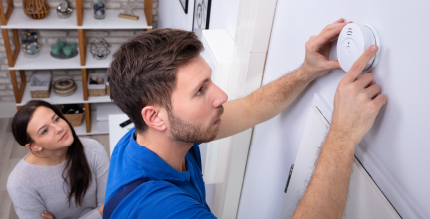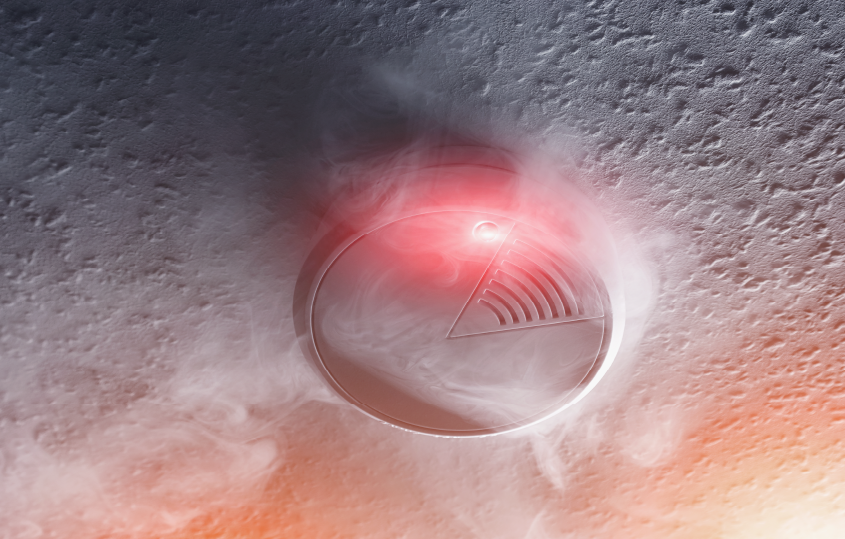Residential and commercial properties across the country have some type of smoke alarm in case of a fire. There are two smoke detector types: ionization and photoelectric. These smoke detector types and uses effectively detect smoke particles, but there is much debate over which is more appropriate to install to protect people.
We put together the following article to help you understand your options for protecting your home or business from fires.
Ionization Smoke Alarms
The main difference between ionization and photoelectric technologies is the type of fires they detect. Ionization smoke alarms respond to flaming fires involving aggressive and open flames. The fire usually consists of igniting flammable liquids, wood, paper, or open flames around combustible materials.
Ionization smoke alarms work by using a tiny piece of radioactive material that is located between two electrically-charged plates. The air then ionizes and causes an electrical current between the plates, causing the smoke particles to disrupt the current and activate the alarm.
Photoelectric Smoke Alarms
This type of detector better detects fires that begin with a long period of smoldering. Smoldering fires, as they’re referred to, are slow and flameless and usually occur when smoking materials, such as cigarettes, are left unattended.
Photoelectric smoke alarms respond to smoldering fires by aiming a light source into a chamber with a light sensor. When smoke particles enter the chamber, the light beam is blocked and reflects light onto the sensor, triggering the alarm.

How to Decide Between the Two
Across the board, experts agree that no one smoke detector type is better than the other since every fire is different. The ionization and photoelectric technologies are effective at detecting different types of potentially fatal fires, and because fires are highly unpredictable, having both detectors is the standard recommendation.
There have been many tests to determine if ionization smoke alarms are better than photoelectric and vice versa. There are reports for full-scale fire tests for both photoelectric and ionization detectors, and still, the consensus seems to be that both detector types are responsive and reliable.
The U.S. Fire Administration has two recommendations for residential spaces where people sleep. The first is installing ionization and photoelectric smoke alarms. The second is a dual-sensor alarm with both ionization and photoelectric technologies. Following these recommendations will provide the best protection for your home.

Installing Smoke Detectors
Although the smoke detector type you install is an important decision, another critical factor to consider is the unpredictable nature of fire. The best recommendation, in this case, is to follow the manufacturer’s guidelines about the best placement in your home for your detectors.
There are also local building guidelines you will need to follow as well. For example, the Houston Fire Department states homes should have a smoke detector in every bedroom, hallway, and living area on top of having at least one alarm on each floor of a house. It is also advised that smoke alarms are never installed in the kitchen, as cooking can easily trigger the alarm. Smoke alarms should also never be placed on or near an air conditioning vent since they will interfere with the detectors.
The National Fire Protection Association also has recommendations for installing and maintaining smoke detectors. They should be stationed at least 10 feet away from cooking appliances. Additionally, wall-mounted alarms should be 12 inches from the top of the alarm to the base of the ceiling.
It is possible to install it yourself, but you do need to ensure that you do it properly and test that the smoke alarms work. Your detector should have a test button that makes this process easier.
It’s also essential that you replace dead batteries in smoke alarms as soon as possible. Most smoke detectors are designed to have an effective battery life, lasting up to 10 years! If the alarm ever starts chirping, it’s a warning that the battery life is low and needs to be replaced.
If you live in an apartment complex, you should be able to submit a request to the maintenance crew to replace the dead batteries. If you are a homeowner, you can follow the manufacturer’s list of battery recommendations, which should be on the back of the alarm or in the instruction.
Customizable Solutions for You
If you are still concerned about protecting your home or business, Mesa Alarms offers the finest surveillance and alarm systems in Houston. We take the time to sit down with you to hear your concerns and respond with a plan that is tailored to you.
For residential fire alarm systems, we offer alarms capable of sensing the first signs of smoke to keep you and your loved ones alerted because our system maximizes evacuation time and limits fire damage.
Our commercial fire alarm systems are just as effective in protecting your employees and property. We will consider every aspect of your business to make a custom plan. We offer an efficient installation process and 24/7 monitoring services to ensure that you always have peace of mind.
Over 32 years of experience in the field has taught us how to solve everyday needs for protection. We design security systems for fires, heat detection, burglars, medic alerts, video surveillance, and access control; the best part is that they are all offered as separate packages or combinations.
Safety is a priority, and you’re one consultation away from securing yours with Mesa Alarms



